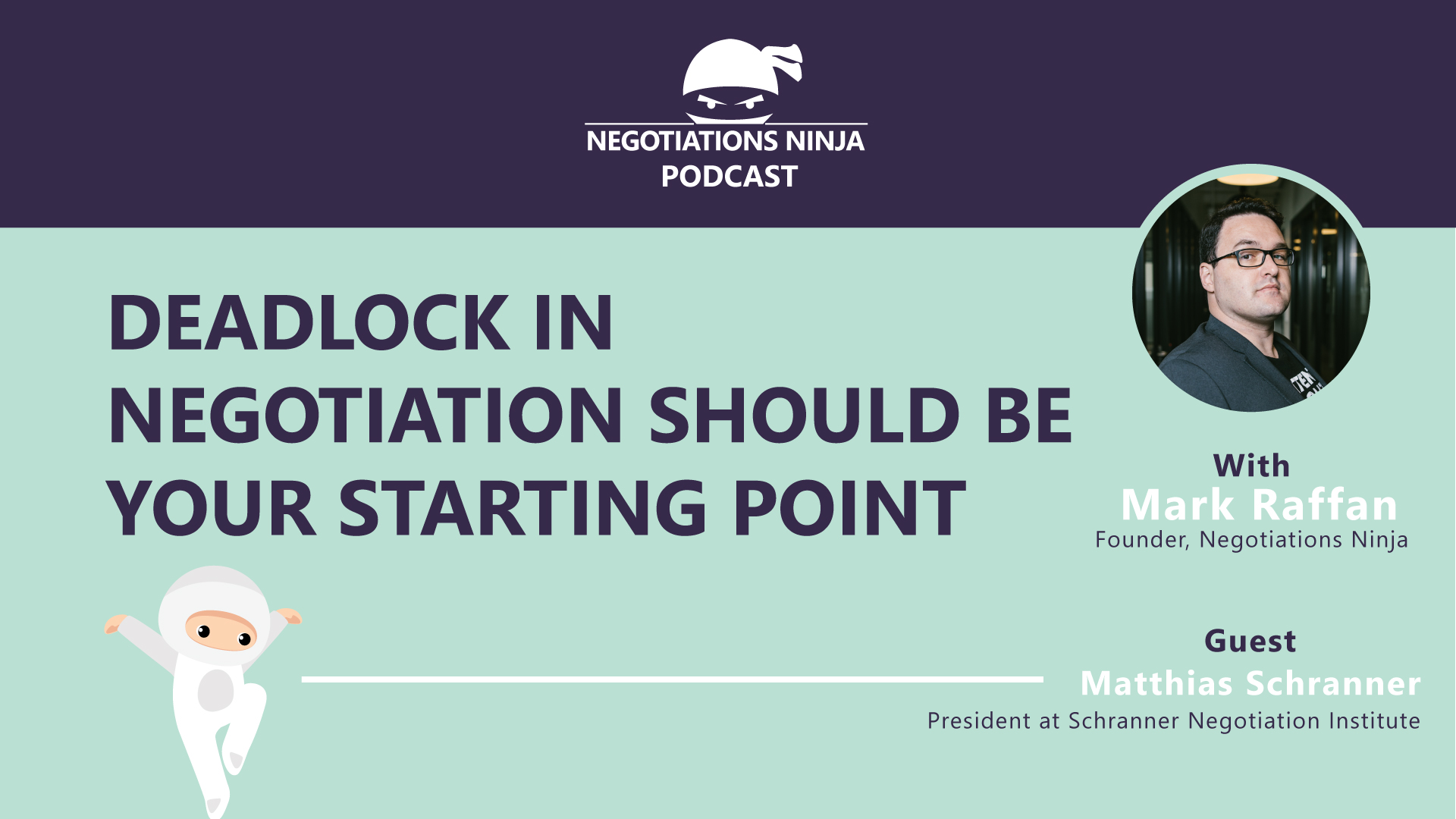In this episode of Negotiations Ninja, we’re talking with Matthias Schranner—former hostage negotiator and founder of the Schranner Negotiation Institute—about the mistakes that people make in negotiations. We’re focusing on the biggest mistake—the avoidance of deadlocks. Why shouldn’t we avoid deadlock? Because sometimes starting in a deadlock gets you to the best possible outcomes. Matthias shares why it’s important to start with a deadlock and more importantly, how to get out of them.
Outline of This Episode
- [2:28] Matthias Schanner’s background
- [4:15] The biggest mistakes made in negotiation
- [5:46] Why negotiators avoid deadlocks
- [6:28] How do we move beyond the deadlock
- [8:35] Why should a negotiation exclude the CEO?
- [10:27] How to avoid damaging the relationship
- [14:19] Habits that help you embrace deadlock
- [16:25] All about the ‘N Conference’
- [18:25] 3 tactics to improve negotiation results
- [20:13] How to connect with Matthias online
Deadlock in negotiation is inevitable—so embrace it
We all fear conflict, we all fear rejection, and we all fear ridicule. Most people do everything they can to avoid deadlock in negotiation because they aren’t properly trained to handle it. But in negotiation, conflict is inevitable. Trying to avoid it could hinder your ability to reach your desired outcome. So what do you do?
Philosophy #1: This philosophy dictates that you deal with the low-hanging fruits first and leave the difficult stuff for the end. It’s geared towards maintaining the relationship, but you often give up what you were negotiating for.
Philosophy #2: This is the philosophy that Matthias embraces: Put the demand on the table first. Tell them what you want first. Don’t circle around the conflict. When you put your demands on the table first, then you can focus the negotiation on your desired outcome.
Starting a negotiation with conflict—intentionally putting yourself in a deadlock situation—means that both parties are laying out their demands and desired outcomes. If there is no conflict and healthy tension, it means you probably aren’t going to get what you want out of the negotiation. You’re essentially giving in.
Relationships can hinder the negotiation
In business, there could be many reasons why you don’t want your negotiation to become deadlocked in conflict. But one of the main reasons is the desire to protect the relationship. It’s important to maintain business relationships but in doing so we often sacrifice what we want to ensure we don’t damage the relationship.
In a company, often the person with the best relationship to the opposing party will be sent into the negotiation, likely in hopes that the relationship will help the negotiation go smoothly, but that isn’t the case. That relationship will stop each party from putting the conflict on the table.
Matthias says it’s important to send someone who does not have a relationship with the other party. Secondly, you need a commander. A commander should be someone who is never at the table—but making the decisions and creating the strategy in the background.
This person is typically the CEO of the company. They need to ensure they can maintain their relationships once the negotiation is complete—without any dirt on their hands. So it’s imperative they stay out of the direct negotiation. How do you convince them to stay out of the negotiation process? Listen to find out.
Embrace respect when you’ve reached a deadlock in negotiation
In being upfront with the conflict, it’s important to be respectful. Matthias notes that placing your demands on the table won’t ruin the relationship—but a disrespectful tone may. When under stress or pressure, a lot of people speak disrespectfully and use tricks, unfair tactics, or threats. It’s important to be respectfully demanding. Don’t tell them ‘I’m right, you’re wrong’. The goal of the negotiation is to reach an agreement or find a solution. That will not happen if the negotiation isn’t based on mutual respect.
Resources & People Mentioned
Connect with Matthias Schranner
- Schranner Negotiation Institute
- Connect on LinkedIn
- Follow on Twitter
Connect With Mark
- Follow Negotiations Ninja on Twitter: @NegotiationPod
- Connect with Mark on LinkedIn
- Follow Negotiations Ninja on LinkedIn
- Connect on Instagram: @NegotiationPod




